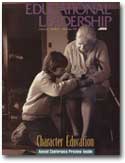TQM Authors Miss Perspective on Joy
That W. Edwards Deming's aim for schools is joy in learning is the perspective missing from your feature on Total Quality (September 1993).
The element of psychology is especially critical to understanding what Deming means. A key teaching concerns the benefits of intrinsic motivation. Managers rob workers of their natural motivation to do their best when managers do not provide constancy of purpose for the organization; emphasize short-term results; appraise individual performance instead of systems' results; and manage by meaningless data.
Most of the practices recommended by your authors can become mutations of these deadly diseases. This happens, explains Deming, when leaders are without profound knowledge, a deep understanding of the interplay of variations, psychology, knowledge, and systems.
One could make the case that educators, with our strong backgrounds in psychology, have the opportunity to help the business world understand this concept. We are all workers, whether we work on machines, with our hands, or in a classroom. The better we understand this, the more likely we are to experience joy in our lives as well as in our work.
—Gail M. Stephens, Deputy Executive Director, American Association of School Administrators, Arlington, Virginia
Reply: Joy Figures Prominently
Because Stephens doesn't respond to my specific arguments, it isn't easy to understand the assertion that I lack an understanding of Deming's philosophy. In fact, joy in learning figures prominently in my book, Punished by Rewards. More important, this concept is central to the work of many educators, which leaves me wondering why we need to import methods and metaphors from the corporate world.
—Alfie Kohn, Cambridge, Massachusetts
Marketplace Models Valuable to Educators
I share Alfie Kohn's concern that we not jump on the TQM bandwagon. However, I vehemently disagree with his premise that education cannot derive value from a “marketplace model.”
I came to the classroom after 15 years in corporate management, and my business orientation best explains my effectiveness. A performance orientation is not inconsistent with child growth and development. Rather a movement away from performance is the snare that will prevent educators from ever having to be accountable for results.
Kohn describes the ideal classroom as a place of “intellectual exploration and development.” Students and teachers who pursue the act of discovery without performance targets are never challenged to prove that their discoveries really matter. I suggest that the classroom should be a place of discovery in the context of results-oriented demonstrations of increasing proficiency.
Using such business nomenclature as “customer” and “products” stretches us to think about what we are doing. I hope educators continue to examine systems paradigms that will require us to look outside our profession for benchmarks that ensure our continuous improvement.
—C. Mark Ealy, Educational Consultant, Ohio Department of Education, Columbus, Ohio
Pitfalls of “Authentic” History
We see value in authentic learning and assessments when they help students see connections between history and real-world activities (Trends, Social Studies, May 1993), but we want to warn against potential pitfalls. In a rush to relevance, we must not recast content and require history to fit the process.
Our aim should be to teach the social sciences in greater depth, not to create glib generalizations and facile comparisons. For example, while it may be easier to teach the connection between revolt in Tiananmen Square and Thomas Jefferson's view of revolution, it is more intellectually honest to study how the students' use of Jefferson's words embodies meaning of their own within the context of Chinese culture and history.
In today's desperation to find relevance to students' lives, we must avoid misinterpreting the world of the past and the world in which students will live. Without an adequate knowledge base that includes chronology and sequence, students will be inadequately prepared to reason critically and make judgments. In other words, authentic learning and authentic assessments have to work from a database broader and richer than this evening's television news.
—Catherine Fish Petersen, President, New York State Social Studies Supervisory Association; and Gloria Sesso, Social Studies Supervisor, Half Hollow Hills, Central School District, Dix Hills, New York
Open Letter: Voucherism Threatens Public Schools
The passage of California's Proposition 174, the voucher initiative, threatens our public schools. The developers advocate reform of our basic American ideals away from unity, inclusiveness, pluralism, equality, and egalitarianism. The new legislation would legally sanction and support at public expense the creation of private, exclusive, selective, segregated, and religious mini-schools.
—Arthur and Joyce Bertoldi, Huntington Beach, California
